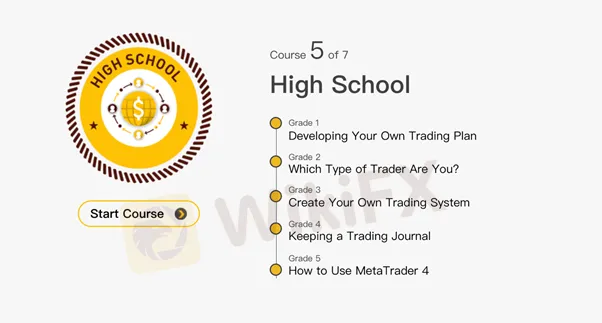简体中文
繁體中文
English
Pусский
日本語
ภาษาไทย
Tiếng Việt
Bahasa Indonesia
Español
हिन्दी
Filippiiniläinen
Français
Deutsch
Português
Türkçe
한국어
العربية
The Ultimate Checklist for Newbie Traders
Abstract:It is common for a beginner forex trader to feel overwhelmed when starting in the forex market. There are many concepts and strategies to learn, and it can be challenging to understand the various aspects of trading. But fret not, as WikiFX has compiled an ultimate checklist for all beginners out there:

To overcome the feeling of being overwhelmed, beginners should take their time to learn and understand the various concepts and strategies involved in forex trading. It is essential to have a structured approach, focusing on one aspect at a time and seeking guidance from experienced traders or educators. Patience and persistence are two important elements that one should possess in the quest of becoming a successful forex trader.
It is common for a beginner forex trader to feel overwhelmed when starting in the forex market. There are many concepts and strategies to learn, and it can be challenging to understand the various aspects of trading. But fret not, as WikiFX has compiled an ultimate checklist for all beginners out there:
Forex Market Overview: You need to have a thorough understanding of the forex market, such as how it operates and the different participants involved in it.
Currency Pairs: You need to learn about the different currency pairs and their characteristics, such as majors, minors, and exotic pairs.
Fundamental Analysis: You need to learn how to read and interpret economic indicators, such as GDP, inflation, and interest rates, and how they affect the currency market.
Technical Analysis: You need to learn how to read charts, identify trends, and use technical indicators to make trading decisions.
Trading Strategies: You need to learn about different trading strategies, such as swing trading, day trading, and position trading, and choose the one that fits your trading style.
Risk Management: You need to learn how to manage your risk by setting stop-loss orders, determining your position size, and managing your leverage.
Trading Psychology: You need to learn how to manage your emotions, develop discipline, and control your biases when making trading decisions.
Forex Brokers: You need to learn about different forex brokers, their regulations, fees, and trading platforms, and choose the one that best suits your needs.
Demo Trading: You need to practice trading on a demo account to gain experience and confidence before trading with real money.
Further, expand your knowledge: You must keep learning and updating your knowledge as the forex market constantly evolves, and new strategies and techniques are always emerging.
WikiFX is a company that provides forex-related services, including forex education through its education website. The WikiFX education website (https://www.wikifx.com/en/education/education.html) is designed to provide traders with comprehensive and relevant information about the foreign exchange market, trading strategies, risk management, and more.

The website features a range of educational materials, including articles, tutorials, webinars, and e-books. These resources cover topics such as technical analysis, fundamental analysis, trading psychology, and trading strategies. The website is designed to be accessible to traders of all levels of experience, from beginners to advanced traders.







The website also includes a range of tools and resources to help traders stay up to date with market news and analysis. This includes daily market updates, economic calendars, and trading signals.
In addition to its educational resources, the WikiFX education website also provides a range of other services to help traders. This includes a forex broker comparison tool, which allows traders to compare and choose the best forex brokers for their needs.
Overall, the WikiFX education website is a comprehensive resource for traders looking to improve their knowledge and skills in the forex market.

Disclaimer:
The views in this article only represent the author's personal views, and do not constitute investment advice on this platform. This platform does not guarantee the accuracy, completeness and timeliness of the information in the article, and will not be liable for any loss caused by the use of or reliance on the information in the article.
Read more

The Most Effective Technical Indicators for Forex Trading
Master Forex trading with the most effective technical indicators like RSI, MACD, and Bollinger Bands to spot trends and boost profits in 2025.

Pepperstone Adds 79 Stocks to 24-Hour US Share CFDs
Pepperstone expands 24-hour US share CFDs, adding 79 stocks like Tesla and Nvidia, meeting demand for after-hours trading opportunities.

Top Profitable Forex Trading Strategies for New Traders
Know profitable Forex strategies for beginners, including risk management tips, best currency pairs, technical analysis tools, and timeframe selection.
JustMarkets Review 2025: Live & Demo Accounts, Withdrawal to Explore
Established in 2012, JustMarkets (Formerly JustForex) is an online forex broker based in Cyprus and serves clients in over 160 countries. Featuring a low entry barrier, a 50% deposit bonus, and robust trading platforms -MT4 and MT5, JustMarkets has gained great popularity among retail investors in recent years. JustMarkets allows traders to trade over 260 CFD-based instruments, which is not an extensive range, yet on leverage up to 3000:1 to increase trading flexibility. To enhance the trading experience, both MT4 and MT5 are provided, along with JustMarkets Trading App, MetaTrader Mobile App, and MetaTrader WebTerminal. JustMarkets offers a 50% deposit bonus to boost traders' confidence. Opening an account is a fully online process, typically completed within one day.
WikiFX Broker
Latest News
Forex Trading: Scam or Real Opportunity?
The Hidden Tactics Brokers Use to Block Your Withdrawals
Beware: Online Share Buying Scam Costs 2,791,780 PHP in Losses
5 things I wish someone could have told me before I chose a forex broker
Unmasking a RM24 Million Forex Scam in Malaysia
U.S., Germany, and Finland Shut Down Garantex Over Money Laundering Allegations
Gold Prices Fluctuate: What Really Determines Their Value?
Dollar Under Fire—Is More Decline Ahead?
What Impact on Investors as Oil Prices Decline?
Is the North Korea's Lazarus Group the Biggest Crypto Hackers or Scapegoats?
Currency Calculator






